Una campagna di Teatro Sguardo Oltre
ContattiRecupera la tua password
Inserisci il tuo indirizzo email: ti invieremo una nuova password, che potrai cambiare dopo il primo accesso.
Password inviata
Controlla la tua casella email: ti abbiamo inviato un messaggio con la tua nuova password.
Potrai modificarla una volta effettuato il login.

JEZABEL
- Raccolti € 40,00
- Sostenitori 2
- Scadenza Terminato
- Modalità Raccogli tutto Informazioni
Raccogli tutto
Il tuo contributo servirà a sostenere un progetto ambizioso. Scegli la ricompensa o la somma con cui vuoi sostenerlo e seleziona il metodo di pagamento che preferisci tra quelli disponibili. Ti ricordiamo che il progettista è il responsabile della campagna e dell'adempimento delle promesse fatte ai sostenitori; sarà sua premura informarti circa come verranno gestiti i fondi raccolti, anche se l'obiettivo non sarà stato completamente raggiunto. Le ricompense promesse sono comunque garantite dall’autore.
- Categoria Teatro & danza
Il Progetto
4 - 9 aprile 2017, Pacta Salone, Milano
IRÈNE NÉMIROVSKY
JEZABEL
Traduzione Maddalena Mazzocut-Mis
Adattamento Sofia Pelczer e Maddalena Mazzocut-Mis
Regia Sofia Pelczer
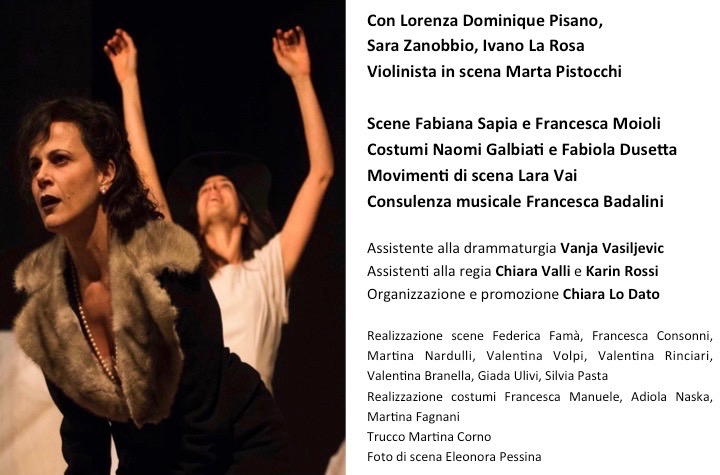
Produzione Teatro Sguardo Oltre con il patrocinio del Municipio 6 di Milano
IL PROGETTO
“La nuova sciagura della nostra epoca sembra essere la Madre Narcisista, la Grande Madre concentrata su se stessa non in grado di trasmettere ai figli la possibilità dell’amore come realizzazione del desiderio e non come il suo sacrificio mortifero.”
(M. Recalcati)
Jezabel di Irène Némirovsky (1936), è permeata da un’attualità sorprendente. Ci siamo riconosciute nell’opera e nelle domande che pone.
La prima fase di prove si è conclusa con una restituzione aperta e gratuita per la cittadinanza milanese il 18 gennaio 2017 presso lo spazio comunale Ex-Fornace.
Jezabel sarà in scena a Milano, dal 4 al 9 aprile2017, al Pacta Salone (via Ulisse Dini, 7 Milano)
Teatro Sguardo Oltre non accede a contributi pubblici, si sostiene con le proprie forze.
Sostienici anche tu, aiutaci a crescere!
Chiediamo il tuo sostegno per coprire parte dei costi necessari a realizzare lo spettacolo!
LO SPETTACOLO
“Oh, Marie-Thérèse, promettimi che il giorno in cui mi vedrai vecchia, veramente vecchia, miucciderai nel sonno.”
Aula di tribunale nella Parigi degli anni ’30. L’imputata è Gladys Eysenach, colpevole dell’omicidio del suo presunto giovane amante. Da qui inizia, in un flashback vorticoso, la mise-en-scène soggettiva del suo rapporto con gli uomini, con la figlia in età da marito, ma soprattutto con se stessa, le sue inquietudini e il suo disperato bisogno di sentirsi amata e desiderata.
Jezabel è il ritratto di una vedova ricca e indipendente (Lorenza Dominique Pisano), ossessionata dalla paura di invecchiare. Nasconde la sua identità anagrafica dietro l’immagine alla cui forza ammaliatrice nessuno può resistere. Il tentativo disperato di fermare il tempo è il motore di ogni sua azione, di ogni sua relazione e di ciascuna frase da lei pronunciata. La protagonista vive in balia del suo narcisismo, del desiderio di ritrovare quell’ebbrezza giovanile dell’attimo in cui tutto può ancora accadere.
Lo spettacolo verte sul conflitto feroce tra una donna, aggrappata al proprio passato, e le generazioni successive, che si sentono derubate del proprio presente.
“La luce del giorno inizia a filtrare e i volti cominciano di nuovo a risplendere sotto i raggi, inesorabili, con il loro trucco sfatto e le loro rughe sempre piùdisegnate.”
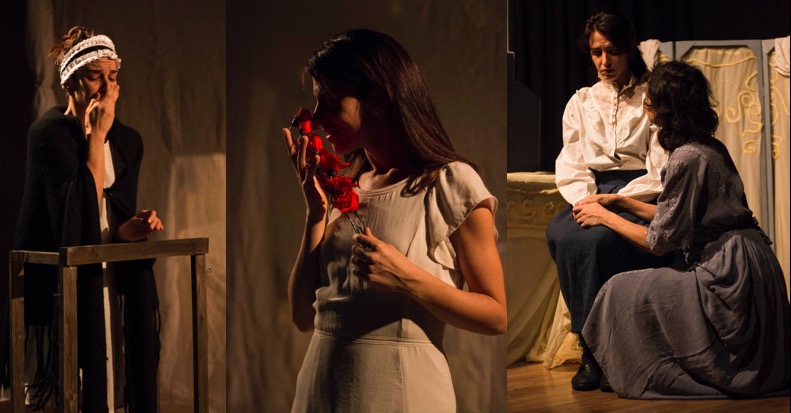



Dal primo fallimento sentimentale nascono l’ossessione dell’età e la lotta contro il tempo che passa inesorabilmente. Insieme a esse appare una seconda figura femminile (Sara Zanobbio), molto più giovane: il doppio. È l’immagine del suo corpo giovane con cui Gladys non riesce a fare i conti, è il suo subconscio che insinua, prima delicatamente poi con sempre maggiore insistenza, il tramonto della giovinezza e di un’epoca. La loro relazione si sviluppa tra conflitti e confidenze, riflessi nello specchio dei ricordi.
“Ho amato solo la sottomissione, il desiderio, la follia. È spaventoso aver fatto dell’amore l’unica ragione di vita e vederlo sfuggire. Ma tutte quelle donne come me, che non sono tranquille borghesi e brave madri di famiglia, soffrono anche loro?”
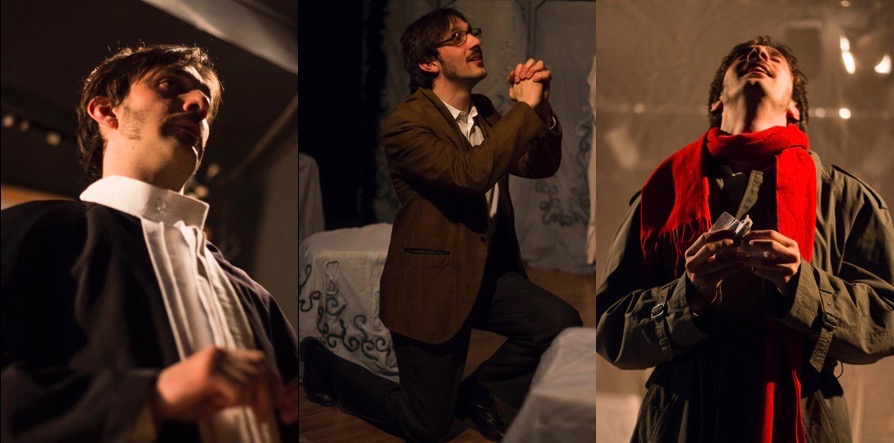
Il personaggio maschile (Ivano La Rosa) incarna il coro di spasimanti, amanti e corteggiatori, che con il passare degli anni si trasformano in clienti a cui vendere il desiderio o desiderati compagni di vita in fuga dalla solitudine e dalla vecchiaia. La tragica rivelazione della vera identità del ragazzo da lei ucciso porta inevitabilmente all’estremo la lotta contro l’età. O forse no. Forse Gladys riesce ancora una volta a salvare la sua maschera?
“Maledetti vecchi! Tutti attaccati ai soldi! Si tengono stretta la loro felicità e lasciano ai figli solo la disperazione, la miseria e la morte. Maledetta Jezabel! Può ancora sfoggiare un corpo agile, tingersi i capelli, ma la sua anima puzza di marcio.”

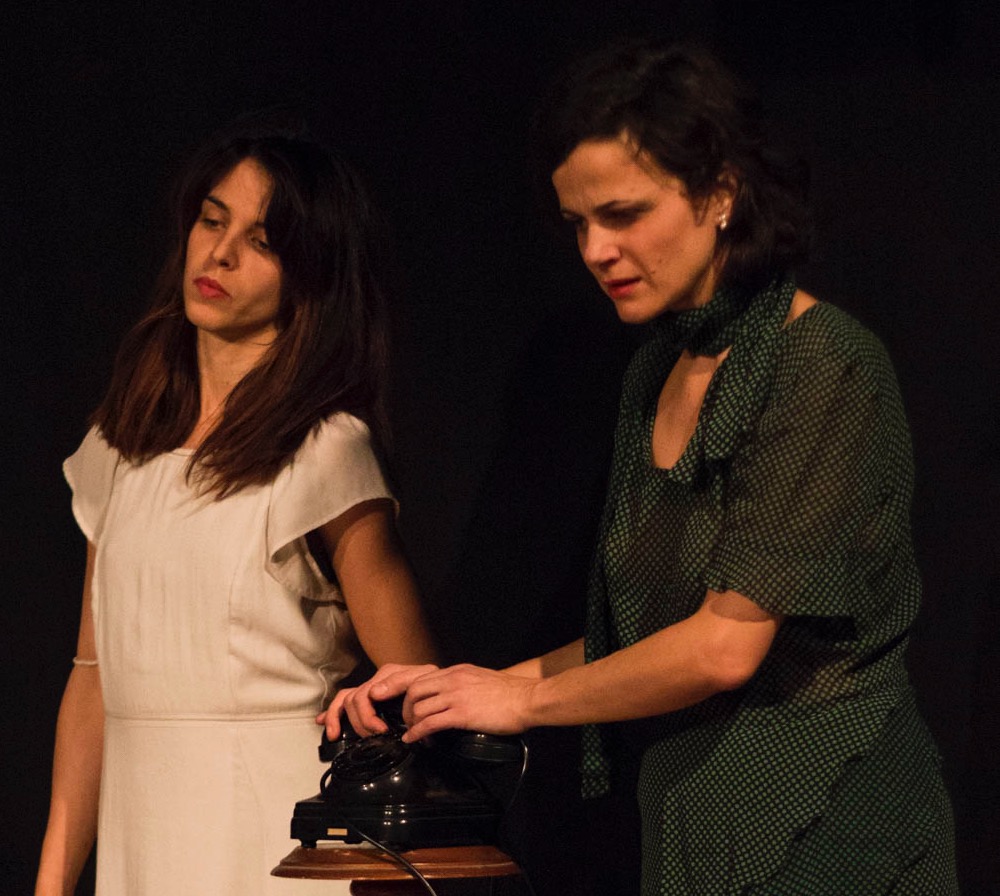
Gladys Eysenach, in una messinscena tutta soggettiva, rievoca la sua vita a ritmo di swing, come in un turbine di emozioni e frivolezze. Nella cornice metateatrale si mescolano i generi del giallo, del dramma psicologico e del melodramma. La violinista in scena (Marta Pistocchi) scandisce gli accadimenti con le melodie di Ravel, Debussy e le musiche dei peggiori locali della Parigi degli anni ’30.
PERCHÉ ABBIAMO BISOGNO DEL TUO SOSTEGNO
I fondi reperiti serviranno principalmente per sostenere i costi di produzione dello spettacolo:
→ allestimento (scene e costumi)
→ sala prove
→ materiali di promozione e comunicazione
→ oneri fiscali
GRAZIE PER IL VOSTRO PREZIOSO AIUTO!
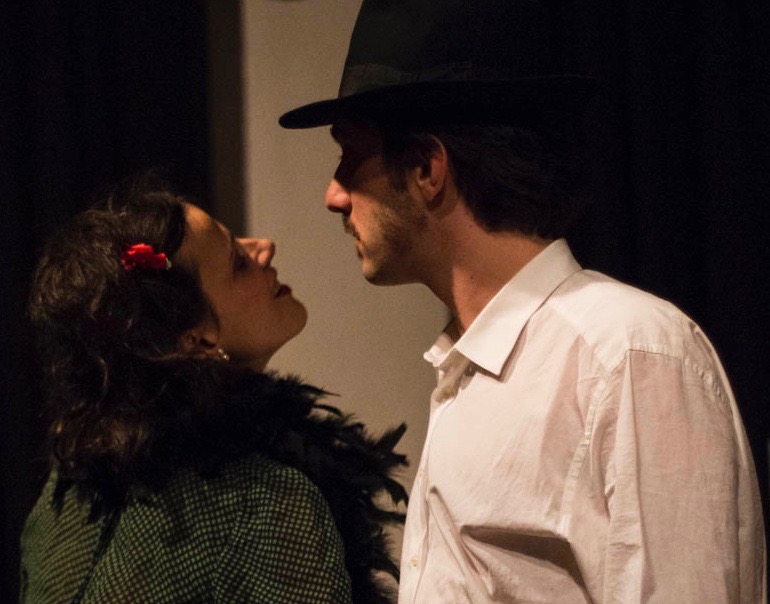
CHI SIAMO
IRÈNE NÉMIROVSKY, nata a Kiev nel 1903 da una ricca famiglia ebraica, a seguito degli sconvolgimenti dovuti alla Rivoluzione d’ottobre, nel 1919 è costretta a trasferirsi in Francia, dove si laurea in lettere alla Sorbona. Pubblica racconti dai diciotto anni, ma conosce il successo critico e di pubblico solo nel 1929. La sua produzione letteraria da quel momento si moltiplica: Il ballo (1930), Come le mosche d'autunno (1931), Il vino della solitudine (1935), I cani e i lupi (1940) e I doni della vita (1941) sono solo alcuni dei suoi romanzi più celebri. Sebbene le sia impedito di pubblicare durante l’occupazione tedesca, Irène continua a scrivere romanzi fino alla deportazione ad Auschwitz, dove muore nel 1942.
L’opera della Némirovsky viene riscoperta solo negli anni ’90 e ha un successo clamoroso nel 2004 grazie al romanzo inedito e incompiuto Suite francese che vince il Prix Renaudot. Da quel momento in Italia sarà Adelphi a rendere giustizia al talento della scrittrice, pubblicando la sua opera omnia.
ASSOCIAZIONE TEATRO SGUARDO OLTRE nasce nel 2008 per creare un luogo dove far incontrare le rinnovate esigenze del pubblico con i nuovi linguaggi scenici e artistici in generale. La direzione artistica è affidata a Sofia Pelczer. L’associazione realizza interventi nel settore culturale producendo e distribuendo spettacoli teatrali e letture. Menzioniamo lo spettacolo La misteriosa scomparsa di W di Stefano Benni che ha debuttato allo Spazio MIL e ha circuitato presso rassegne e stagioni significative della Lombardia; la partecipazione alla Festa del Teatro per l’intero progetto; la collaborazione con le biblioteche del Comune di Milano. Nel 2014 l’Associazione ha inaugurato la stagione del Teatro OutOff con La corsa dei mantelli di Milo De Angelis. Inoltre è stata responsabile organizzativa del progetto Archivi in Rete (2011-2012) per conto della Fondazione Milano con il contributo di Fondazione Cariplo. Nel biennio 2012-2013 è stata partner del Comune di Milano per il progetto Ci vediamo tutti in Biblioteca!, con il contributo di Fondazione Cariplo. Lo stesso progetto di Fondazione Cariplo la vede partner dei Comuni di Senago, Paderno Dugnano e Cesate in Telemaco nelle città nel triennio 2014-2016.
SOFIA PELCZER, regista di origini ungheresi, si diploma in regia teatrale presso l’Accademia d’Arte Drammatica Paolo Grassi di Milano, dove è attualmente docente di regia. Completa la sua formazione con diversi anni di assistenza alla regia al fianco di Massimo Navone e con la partecipazione al corso triennale di “Pedagogia della Scena” tenuto dal M° Anatolij Vasiliev. Inizia la sua attività di regista rappresentando Orfeo di J. Cocteau. La sua attenzione si focalizza da sempre sulla drammaturgia contemporanea, mettendo in scena tra altri La bambina gelata di M. von Mayenburg (Astiteatro), Trilocale di José Maria Vieira Mendes, L'Angelo Elettrico di R. Macranici e La misteriosa scomparsa di W di Stefano Benni. Allestisce, inoltre, spettacoli-evento che vedono una riconsiderazione del rapporto tra scena e pubblico, come Alle radici dell’Europa (Teatro della Tosse), Un po’ per Celia (Pergine Spettacolo Aperto) e La festa (Fabbrica dell'Uomo).
MADDALENA MAZZOCUT-MIS è docente di Estetica ed Estetica dello spettacolo presso l'Università degli studi di Milano. È saggista e drammaturga, la sua attività teatrale si coniuga con la ricerca scientifica. Ha scritto 17 testi drammaturgici tutti messi in scena nei maggiori teatri italiani e stranieri e ha costanti collaborazioni culturali e artistiche con il Piccolo Teatro - Teatro d’Europa, Milano; Teatro Franco Parenti, Milano; Accademia Perosi, Biella; Teatro Elfo Puccini, Milano; Ravenna Festival; Teatro Comunale Giuseppe Verdi, Pordenone; Teatro Ringhiera, Milano; Teatro Verdi-Buratto, Milano; ScenAperta-altomilanese teatri, Milano.
ENGLISH VERSION
JEZABEL
Translation Maddalena Mazzocut-Mis
Adaptation Sofia Pelczer and Maddalena Mazzocut-Mis
Direction Sofia Pelczer
Cast Lorenza Dominique Pisano, Sara Zanobbio and Ivano La Rosa
Violinist on stage Marta Pistocchi
Set Designers Fabiana Sapia and Francesca Moioli
Costume Designers Naomi Galbiati and Fabiola Dusetta
Movement Director Lara Vai
Musical Supervision Francesca Badalini
Assistant playwright Vanja Vasiljevic
Assistant directors Chiara Valli and Karin Rossi
Communications Manager Chiara Lo Dato
Set creation Federica Famà, Francesca Consonni, Martina Nardulli, Valentina Volpi, Valentina Rinciari, Valentina Branella, Giada Ulivi, Silvia Pasta
Costumes creation Francesca Manuele, Adiola Naska, Martina Fagnani
Make-up Artist Martina Corno
Photos Eleonora Pessina
Produced by Teatro Sguardo Oltre, patronised by Milan Townhall 6.
THE PROJECT
"The newest tragedy of our age seems to be the Narcissist Mother, the Great Mother who's all focused on herself and who's not able to pass down to her children the idea of love as a fulfilment of desire, not as her proper deadly sacrifice."
(M. Recalcati)
Jezabel, by Irène Némirovsky (1936), is a surprisingly present novel. We've identified ourselves in this book and in the questions that it poses.
We've undertaken a journey through the author's images and topics to create a theatre play focusing on the Achilles hill of the contemporary woman: the obsession with youth and beauty. What are the consequences of this unhealthy dependence of appearance?
The project development is composed of three phases:
→ composition of the theatre script (from May to October 2016)
→ first session of rehersals (from December 2016 to January 2017)
→ second session of rehersals and debut (from March to April 2017)
At the end of the first session of rehersal we held a free dress rehearsal for the citizens of Milan, which took place on 18th January 2017 at Ex Fornace.
Jezabel will be on stage from April 4th to April 9th 2017 at PACTA Salone (via Ulisse Dini 7, Milan)
Teatro Sguardo Oltre doesn't have the access to public subsidies, it stands on its own feet.
Help us grow, support us!
We ask for your backing to balance the outlay we had to face for the production.
THE PLAY
"Oh, Marie-Thérèse, promise me you'll kill me in my sleep the day you'll see me as an old woman."
Courthouse hall, Paris, 1930s. The accused is Gladys Eysenach, who's guilty of having murdered her young (alleged) lover. From this point, a swirling flashback starts and the play turns subjective; it shows Gladys' relationships with men, with her daughter of marrying age, but above all with herself: her fears and her desperate need to feel loved and desired. Just before the audience's eyes, her life wears itself out to the rhythms of swing, in a rush of emotions and trivialities.
Jezabel is the portrait of a rich and independent widow, who's tormented by the fear of ageing. She hides her real age behind her appearance: nobody is able to resist her charming powers. Her desperate attempt to stop time is the agent of everything she does, every relationship she establishes and every sentence she pronounces. The protagonist lives at the mercy of her vanity and her wish to find again that young thrill of the moment that anything is possible.
The play focuses on the cruel conflict between a woman holding on to her past, and the younger generations, who feel as if they were robbed of their present.
"The daylight begins to filter in and the faces glimmer again in the persisten rays, with their messy make-up and their increasingly marked wrinkles."
The three-actors system itself symbolizes Gladys’ solitude and narcissist battle.
The first romantic disappointment generates a fixation with ageing and the start of a struggle against time that relentlessly passes. Meanwhile another much younger female figure appears (Sara Zanobbio): Gladys' doppelganger. It's the icon of her young body, her subconscious that increasingly meanders in her thoughts; it's the era of youth coming to an end. The relationship between Gladys' and her doppelganger develops through conflicts and secrets, reflections in the mirror of memories.
The male character (Ivano La Rosa) embodies Gladys' lovers and suitors; as the years pass by, they become customers of desire or lifemates who desperately try to run away from loneliness and old age. As the true identity of the murdered young man tragically comes to surface, the struggle against ageing is brought outside too. Or maybe not. Is Gladys able to save her mask once again?
"Damn dotards! They're all stuck to the money! They hold on to their happiness and leave us just despair, misery and death! Damn Jezabel! She still can boast a lively body and colour her hair, but her soul has the stink of something rotten."
Gladys Eysenach, in a subjective mise-en-scène, recalls her life to the rhythms of swing, in a rush of emotions and trivialities. In a metatheatrical frame there's a mixture of genres: crime novel, psychological drama and melodrama. A violinist on stage (Marta Pistocchi) underlines the main events with strains of Ravel, Debussy and the songs listened in the worst Parisian joints in the 1930s.
WE NEED YOUR SUPPORT
Donations will refund the outlay we had to face for the production:
→ Staging (set and costumes)
→ Rehearsal studio fees
→ Communication and promotional materials
→ Royalties and Insurances
THANK YOU FOR YOUR PRECIOUS HELP!
WHO WE ARE
TEATRO SGUARDO OLTRE is a cultural association born in 2008 in order to create a place where the new necessities of today's audience can meet the latest artistic and scenic languages. The art direction is carried out by Sofia Pelczer. The association deals with cultural products and supplies theatre plays and readings. A mention should go to The mysterious disappearence of W by Stefano Benni, whose debut took place at Spazio MIL and joined important festivals and theatre seasons in Lombardy (the Theatre Feast and the cooperation with several libraries in Milan). In 2014 the association inaugurated the Teatro OutOff's new season with The cloaks' run by Milo De Angelis. Moreover, it was responsible for the organisation of the project Archivi in Rete (2011-2012) on behalf of Fondazione Milano with the contribution of Fondazione Cariplo. In 2012-2013 was partner to Milan townhall for the project See you at the library!, with the contribution of Fondazione Cariplo. It's also partner to the towns of Senago, Paderno Dugnano and Cesate in Telemaco, in 2014-2016.
SOFIA PELCZER, director of Hungarian origins, graduated in Theatre Direction at Paolo Grassi Drama Academy in Milan. A longtime assistant director of Massimo Navone, she has worked as director mainly on contemporary dramas; among her many directions are Orfeo by J. Cocteau (first direction), The Cold Child by M. von Mayenburg, Three-room apartment by J.M. Vieira Mendes, The Electric Angel by R. Macranici, The Mysterious Disappearance of W by S. Benni, Sisters of Faith – Women’s Paths in Shakespeare’s World, The Race of Cloaks by M. De Angelis. Furthermore, she has researched the relationship between stage and public and directed itinerant performances (for example The Roots of European Middle Ages through the centre of Genoa in 2004). She is founder and artistic director of Teatro Sguardo Oltre cultural association. She teaches classes at Drama Academies and Schools (Theatre Direction at Paolo Grassi, Franco Parenti theatre, Luchino Visconti Film Academy).
MADDALENA MAZZOCUT-MIS is Associate Professor in Aesthetics and Philosophy at University of Milan (National scientific qualification for full professorship, 2012). She is member not only of the main Aesthetics and Eighteenth-Century Studies Scientific Societies, but also of the Centre for Sensory Studies, Concordia University. From 2002 she has combined scientific research with dramaturgy, writing 17 pièces performed in major theatres in Milan and Italy (such as Piccolo Teatro - Teatro d’Europa; Teatro Olimpico and Teatro Bibiena), and at prestigious festivals (Ravenna Festival). She translates aesthetic categories into theatrical representation at a theoretical level (publications), at an educational level (monographic courses), and also as a playwright (reinterpreting the work of classic authors). Among her works: …among flesh and sky (2015), A dream. A Midsummer Night’s Dream (2013), supported by Fondazione Cariplo; Elena (2013); The king is having fun, from Hugo's Le roi s’amuse (2012); Giocasta (2009).

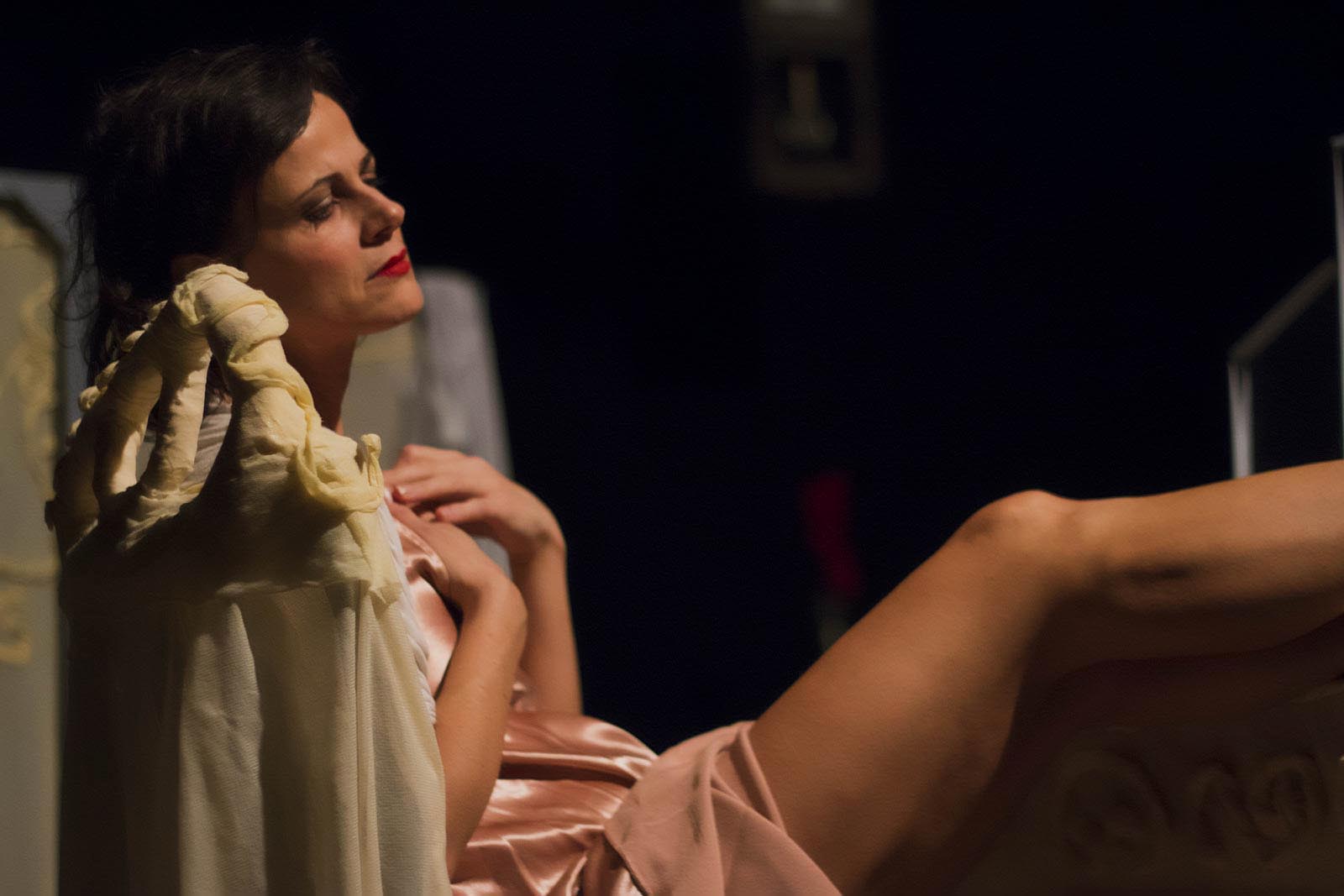
Commenti (2)